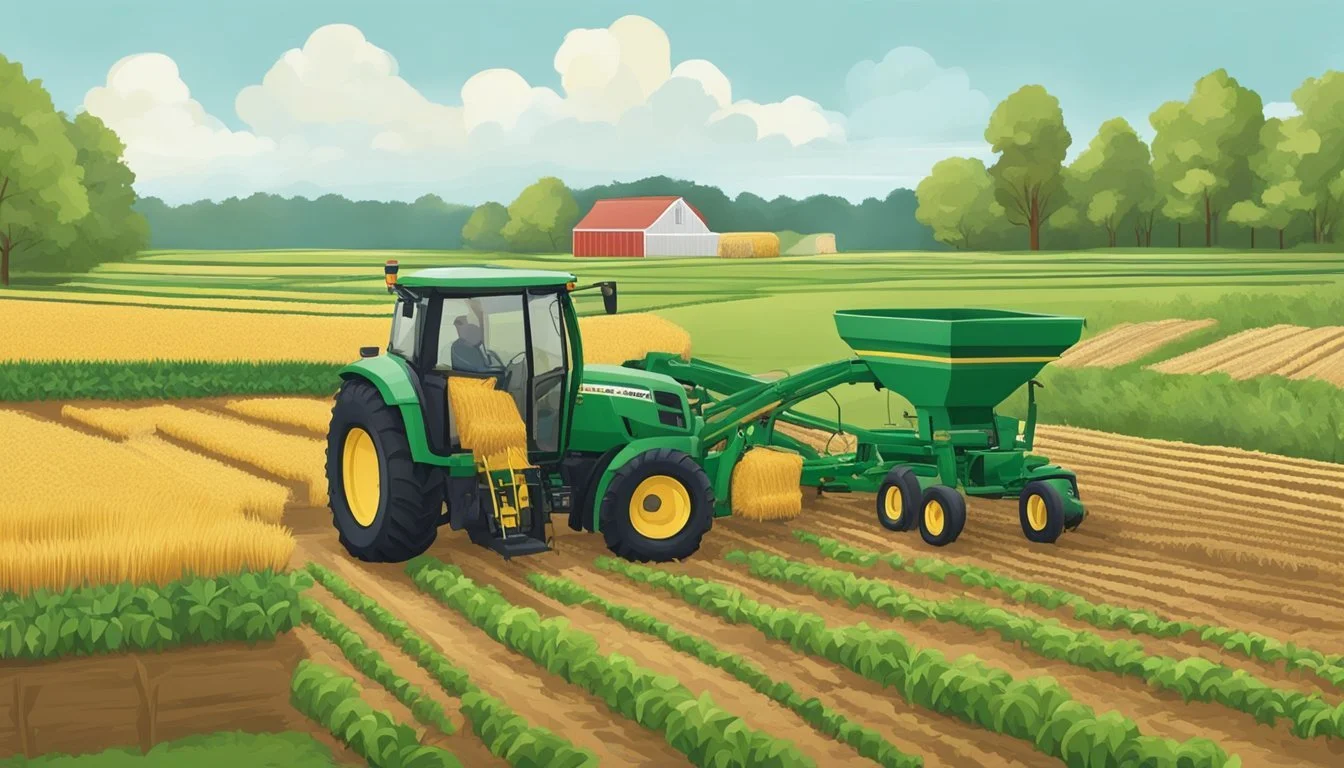Farm Loans in Maryland
Navigating Your Agricultural Financing Options
This Article is Part of Our Guide on Farm Loans for All 50 U.S. States
Farm loans in Maryland provide essential financial support to state agricultural operators. In a state where agriculture is the largest commercial industry, these loans enable farmers and ranchers to manage and develop their operations. Maryland's agricultural sector not only supports over 350,000 jobs but also encompasses over 2 million acres of farmland, highlighting the prime role farming plays within the state's economy.
Financial institutions understand the unique needs of those who work the land, offering tailored loans designed to meet a variety of circumstances. From purchasing new equipment to expanding acreage, farm loans help Maryland's agricultural community thrive. Through agencies like the USDA Farm Service Agency, and private lenders such as Farm Credit and Farm Plus Financial, a myriad of loan options are available to support both beginning and seasoned members of the farming and ranching community.
Access to these financial services ensures the growth and sustainability of farms and ranches. As agriculture evolves, Maryland farmers and ranchers can rely on farm loans to navigate through the challenges and opportunities they face in a dynamic industry. Whether through federal loan programs or private financial services, the intent remains the same: to bolster the backbone of Maryland's economy through dedicated support of its agricultural sector.
Understanding Farm Loans
When it comes to bolstering agricultural production in Maryland, understanding the intricacies of farm loans is crucial. These loans provide the necessary funds for farmers to maintain, expand, or start their operations, ensuring a steady progression in the state's agriculture sector.
Fundamentals of Farm Loans
Farm loans are financial instruments specifically designed to meet the needs of the agricultural sector. They are essential for covering operating expenses, purchasing land, and acquiring equipment. In Maryland, the farm loan limit is generally capped at $300,000, with terms varying based on the nature of the loan. Operating loans, for instance, may have terms ranging from 1 to 7 years, enabling farmers to purchase livestock, seed, feed, and other essentials for farm production.
Types of Farm Loans
Several types of loans cater to different facets of farm credit and farm production:
Direct Farm Ownership Loans: These loans carry a term of up to 40 years and are used to acquire land or construct buildings including soil and water conservation efforts.
EZ Guarantee Loans: With a streamlined application process and less paperwork, they support smaller and non-traditional farm operations.
Conservation Loans: These are geared towards funding conservation practices within an approved conservation plan.
Microloans: Tailored to the needs of smaller, niche, or non-traditional farms and can also support youth agricultural projects.
Emergency Loans: Assists farmers who have suffered losses due to natural disasters by helping to restore or replace essential property, cover all or part of production costs associated with the disaster year, pay essential family living expenses, reorganize the farming operation, or refinance certain debts.
Qualifying for Farm Loans
To secure a farm loan, applicants in Maryland must meet specific eligibility criteria:
Operating History: For example, the USDA loan programs mandate that a beginning farmer should have operated a farm for less than 10 years.
Credit Requirements: A satisfactory credit history is imperative to qualify for any farm credit.
Substantial Participation: Farmers must be actively engaged in and making managerial decisions for the farming operation.
Loan Purpose: The intended use of funds must align with the loan type, such as land purchase for farm ownership loans or operational costs for operating loans.
State Specifics: Residents of the state applying for credit may be subject to specific terms tailored to Maryland's agriculture economy and state laws.
Key Loan Providers in Maryland
In Maryland, farmers and agribusinesses have multiple avenues to secure funding. These range from federal and state-level agencies to commercial lenders specializing in agricultural loans.
Farm Service Agency (FSA)
Farm Service Agency (FSA), a federal entity, offers various loan programs to assist farmers. Maryland farmers can access resources through the FSA, such as the farm loan discovery tool available on farmers.gov. The FSA provides ownership and operating loans, including youth loans tailored to support young individuals. They offer critical loan information and resources to state residents in the agricultural industry.
Maryland Agricultural & Resource-Based Industry Development Corporation (MARBIDCO)
MARBIDCO is a key funding source for Maryland's agribusiness sector. It targets state agricultural enterprises, offering them financial support to foster their growth and sustainability. Their loan programs are designed to meet the unique requirements of Maryland's diverse agricultural industry and support farm acquisition and operations.
Commercial Lenders
Maryland's farmers and ranchers can also turn to commercial lenders for financing needs. Commercial lenders in the state provide a range of farm real estate backed loans, revolving lines of credit, and other agricultural financing products. Institutions like Farm Credit serve the community with consistent credit options, and loan volumes reflect the significant demand in the state's farming sector.
Loan Application Process
When applying for farm loans in Maryland, applicants must navigate through a series of procedural steps, including preparing the necessary documentation, evaluating the best loan options, and understanding the specifics of interest rates and terms.
Documentation and Requirements
For a successful loan application, documentation is paramount. They need:
Proof of identity and residency in Maryland.
Detailed business plan for the farm operation including crop and livestock plans.
Credit history and financial statements.
Information on existing debts and assets for refinance considerations.
Evidence of farm management experience.
A clear track record of farm operation or ownership can aid in securing a loan. Maryland farmers may use the Loan Assistance Tool to determine their eligibility and the required forms for Direct, Operating, and Emergency loans.
Assessing Loan Options
Maryland offers a variety of farm loan options including Direct loans, Operating loans for day-to-day needs, Microloans for small-scale farmers, and loans tailored for farm ownership and expansion. Prospective borrowers should:
Evaluate financial needs against different loan types.
Operating loans for equipment or livestock.
Ownership loans for purchasing land or property.
Consider special programs for beginning farmers or those in need of emergency funds.
Use resources like the farmers.gov site for guidance on loan application procedures.
Careful consideration ensures selection of the most beneficial loan for an individual’s farm goals and circumstances.
Understanding Interest Rates and Terms
Terms and interest rates for farm loans in Maryland vary based on loan type:
Direct loan rates may be lower than market rates and are determined by the government.
Microloan terms provide a streamlined process with less paperwork, designed for smaller, non-traditional farming operations.
Refinance options are available and may offer more favorable rates or terms to existing debtors.
It's important for farmers to comprehend these rates and terms, as they will impact the overall costs and repayment plans of the loan. Regular review ensures they remain in line with the financial health of the farm operation.
Using Loans for Farm Expansion
Farm expansion often requires significant investment, and loans can be a pivotal resource for Maryland farmers looking to scale their operations. This section details how farm loans can be utilized for acquiring additional acreage, enhancing farming infrastructure, and diversifying crops and livestock to ensure a robust agribusiness.
Purchasing Additional Farmland
Securing land loans is an essential step for Maryland farmers seeking to purchase more farmland. With the presence of programs such as the Farm Service Agency's EZ Guarantee loans and the Maryland Resource-Based Industry Financing Fund (MRBIFF), farmers have access to financial support for buying land. These loans typically cover a percentage of the debt financing for a project, improving farmers' purchasing power for acquiring new acreage to grow corn, soybeans or even to start a vineyard.
Investing in Farm Infrastructure
Investing in farm infrastructure such as poultry or dairy facilities, storage, and processing equipment is crucial for agribusiness sustainability and growth. Maryland's MRBIFF program offers low-interest loans for the purchase of capital equipment for production and processing, which agribusinesses can leverage to enhance their infrastructure. This assistance can facilitate the modernization of old structures or the construction of new facilities to meet evolving market demands.
Diversifying Farm Production
Diversification can mitigate risks and open new revenue streams for farmers. Maryland farmers use loans to diversify their production with additional crops like nurseries or specialty produce, and livestock. The FSA's Operating Loans program can assist farmers in covering the costs associated with expanding to niche markets such as berry production or organic produce, including seeds, livestock, and necessary equipment.
Loans play a vital role for Maryland farmers looking to expand their farmland, improve their agricultural infrastructure, and diversify their crop and livestock production. With targeted financial products, Maryland's agribusinesses are positioned to scale effectively and sustainably.
Dealing with Financial Challenges
In Maryland, farmers face a variety of financial hurdles from operating costs to unexpected disasters. It's crucial for farm operations, especially those managed by small and beginning farmers, to navigate these challenges effectively to sustain and grow their agricultural endeavors.
Managing Farm Operating Costs
Farm operating costs can fluctuate significantly, impacting the financial health of farm operations. To manage these costs, farmers should conduct regular reviews of their expenses against their income. They can consider optimizing their use of soil and water resources to increase efficiency, and strategically plan for both the farm's needs and family living expenses. Creating a well-structured budget is essential in ensuring that every dollar is accounted for and spent wisely.
Overcoming Disaster with Emergency Loans
When facing a disaster, Maryland farmers have the option to apply for emergency loans to assist in the recovery of their farm operation. These loans can provide vital funds to replace or repair damaged property, cover the loss of crops or livestock, or help with soil restoration. It's important for farmers to understand the requirements and act promptly to secure the necessary support for their farms in times of crisis.
Loan Refinancing and Consolidation
Refinancing existing loans can offer farmers the opportunity to secure lower interest rates and better terms, which can lead to significant savings over time. Consolidation offers a way to simplify financial management by combining multiple loans into a single loan with a potentially lower monthly payment. For farmers with high-interest debt or those facing short-term cash flow issues, bridge loans can provide immediate relief as they restructure their financial commitments.
Additional Financial Resources
Maryland farmers seeking to manage operating expenses and mitigate agricultural risks have access to a variety of additional financial resources. These resources are aimed at ensuring they can sustain and improve crop production while being protected from unpredictable factors that impact their farming operations.
Crop Insurance and Risk Management
Crop Insurance programs serve as a safety net for Maryland farmers, safeguarding against the loss of their crops due to natural disasters or the drop in the value of agricultural commodities. Farmers can select from a range of insurance plans based on their specific crops and levels of coverage desired. Risk Management strategies are equally important, allowing farmers to navigate through market volatilities and unexpected events that may affect their income and operating expenses.
Key Points:
Insurance plans are tailored for diverse crop needs.
Risk Management includes assessing market trends and safeguarding against potential financial setbacks.
Grants for Maryland Farmers
Maryland offers Grants to support farmers in various aspects of their operations. These grants can be utilized for purchasing essential equipment, investing in farm infrastructure, or implementing innovative agricultural practices.
Examples include:
Grants focusing on sustainable farming methods.
Financial assistance for young and beginning farmers to secure a strong start.
Both crop insurance and grant programs reflect the state's commitment to providing Maryland farmers with the tools they need to succeed in a challenging agricultural landscape. The utilization of these resources allows for a more resilient and stable agricultural economy within Maryland.







